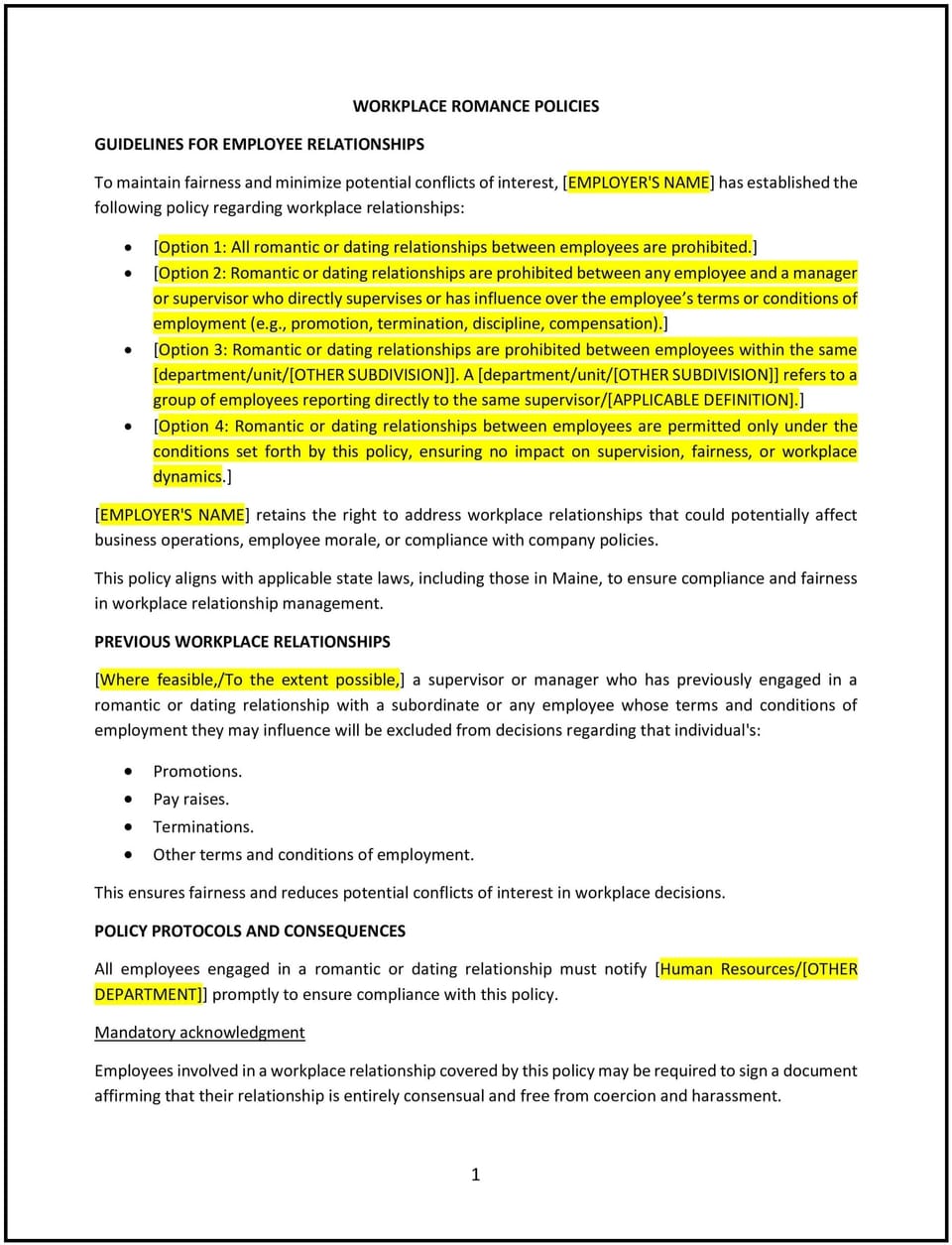Workplace romance policy (Maine): Free template

Workplace romance policy (Maine): Free template
This workplace romance policy is designed to help Maine businesses address relationships between employees, ensuring that these relationships do not interfere with workplace productivity, create conflicts of interest, or lead to harassment claims. The policy outlines expectations for behavior, establishes guidelines for managing romantic relationships in the workplace, and provides a framework for addressing potential issues that may arise.
By implementing this policy, Maine businesses can maintain a professional and respectful work environment while handling workplace romances fairly and transparently.
How to use this workplace romance policy (Maine)
- Define workplace romance: Clearly define what constitutes a workplace romance, including relationships between employees, between managers and subordinates, or between employees and clients/vendors.
- Establish disclosure requirements: Specify when and how employees should disclose romantic relationships to HR or management, particularly if the relationship involves supervisors or colleagues in the same department.
- Set boundaries and expectations: Outline the expectations for behavior in the workplace, ensuring that romantic relationships do not interfere with job performance, create conflicts of interest, or lead to favoritism or discrimination.
- Address conflicts of interest: Define procedures for managing conflicts of interest that may arise from workplace romances, such as reassignment or changes in reporting lines to mitigate the potential impact on work performance.
- Prevent harassment: Emphasize that all romantic relationships must be consensual and that harassment, coercion, or any form of inappropriate behavior is not tolerated under any circumstances.
- Ensure confidentiality: Address how information regarding personal relationships will be handled confidentially and only disclosed on a need-to-know basis.
- Review regularly: Periodically review and update the policy to reflect changes in company culture, legal considerations, or employee needs.
Benefits of using this workplace romance policy (Maine)
Implementing this policy provides several benefits for Maine businesses:
- Reduces the risk of conflicts of interest: Establishing clear guidelines helps prevent romantic relationships from creating biased decision-making or conflicts of interest in the workplace.
- Promotes fairness and transparency: A consistent policy ensures that all employees are treated fairly and that romantic relationships are disclosed and managed properly to avoid negative consequences.
- Minimizes potential harassment: By setting boundaries and expectations for behavior, businesses can help prevent harassment or situations of unequal power dynamics that may arise in workplace romances.
- Supports a respectful work environment: Ensures that personal relationships do not interfere with work performance, fostering a culture of professionalism and respect.
- Enhances legal protection: The policy helps businesses manage potential legal risks related to discrimination, harassment, and retaliation in the context of workplace relationships.
Tips for using this workplace romance policy (Maine)
- Communicate the policy: Ensure that all employees are aware of the workplace romance policy by including it in the employee handbook, during onboarding, and through regular communication.
- Foster an open dialogue: Encourage employees to disclose romantic relationships when appropriate and create an environment where employees feel comfortable discussing any concerns related to workplace relationships.
- Train managers: Provide training for managers on how to handle workplace romances, including recognizing potential conflicts of interest and addressing any issues fairly and professionally.
- Monitor and address potential issues: Stay alert to any signs that a workplace romance may be affecting workplace dynamics, performance, or creating conflicts of interest, and take action as necessary.
- Review and update: Regularly assess the effectiveness of the policy and make adjustments based on employee feedback, changes in company culture, or legal considerations.
Q: When should employees disclose workplace romances?
A: Employees should disclose romantic relationships to HR or management when the relationship involves a manager or supervisor, when there is a potential conflict of interest, or if the relationship may impact workplace dynamics.
Q: What happens if an employee does not disclose a workplace romance?
A: Failure to disclose a workplace romance when required could result in disciplinary action. The business has the right to ensure that any potential conflicts of interest are addressed promptly.
Q: How does the company manage conflicts of interest in workplace romances?
A: The company may reassess reporting lines or assign different projects to employees involved in a romantic relationship to avoid conflicts of interest, favoritism, or disruption to team dynamics.
Q: Are workplace romances between employees in the same department allowed?
A: Workplace romances between employees in the same department may be allowed, but they must be disclosed to HR to ensure that no conflicts of interest or issues with favoritism arise.
Q: How will the company prevent harassment in workplace romances?
A: The company emphasizes that all romantic relationships must be consensual, and any form of harassment, coercion, or unequal power dynamics will not be tolerated. The company will take immediate action if any inappropriate behavior is reported.
Q: What should employees do if they feel uncomfortable about a workplace romance?
A: Employees should report any concerns or discomfort related to workplace romances to HR or their manager in a confidential manner. The company will investigate any concerns and take appropriate action.
Q: How often should businesses review their workplace romance policy?
A: The policy should be reviewed annually or whenever there are significant changes in company culture, legal considerations, or workplace dynamics to ensure its effectiveness and relevance.
This article contains general legal information and does not contain legal advice. Cobrief is not a law firm or a substitute for an attorney or law firm. The law is complex and changes often. For legal advice, please ask a lawyer.


